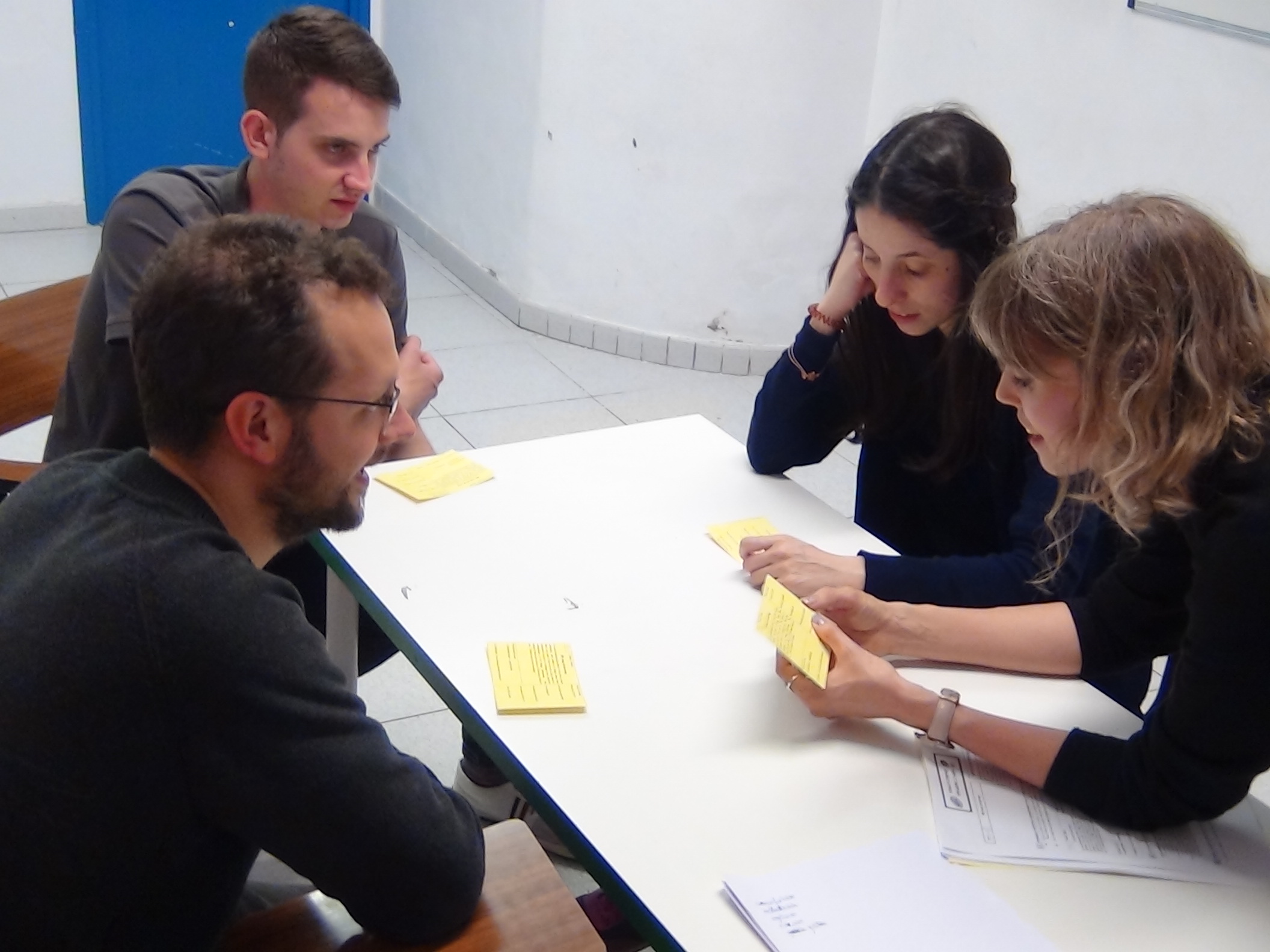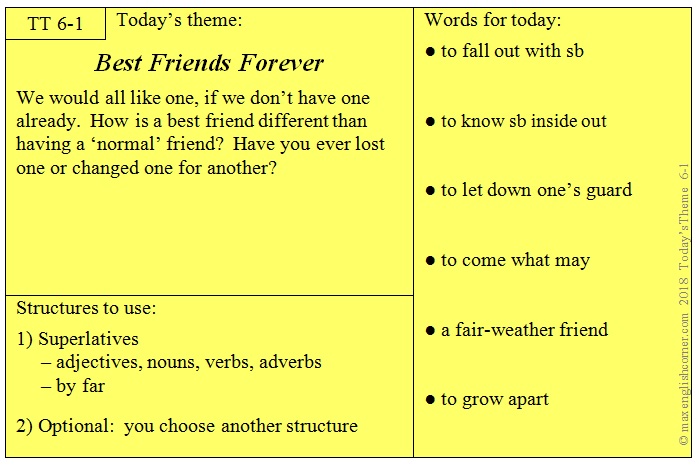Today’s Theme for speaking 6

Welcome to the Today’s Theme page for Friendship. Here you will find 3 different topic questions related to the theme, vocabulary that can be used in the discussions, and optional grammar structures that can also be included. The three questions provided below are independent from each other. Choose one topic for one class and if you like, choose another to follow up further on this theme in the next class.
After the suggestions on how to use the themes & cards you will find for each topic:
● An opening question to introduce the theme and generate some focused interest
● The cards to be handed out to the students
● A few examples of the optional structures which reflect the current theme
● A final question to put to the class (ending the discussion in groups)
The suggested lesson plan basically follows this approach:
PRE-DISCUSSION
● Ask the class an open question to stimulate some interest and bring the students’ attention to the area of focus
● Hand out the cards and go over the vocabulary
● If you decide to include the grammar option, elicit or provide an example or two to make sure the students have an idea of what to include in their speaking
● Students read the passage and remind them to include the target language
DISCUSSION
● Students speak in groups of 2, 3 or 4 for about 5 to 10 minutes
● Monitor, note difficulties, steer them in the right direction if needed
POST DISCUSSION
● Elicit from the class what came up while discussing the question
● Give them feedback about how well they completed the task
SUGGESTED APPROACH to using
TODAY’S THEME speaking cards in class
Click here if you’d like to see a suggested step-by-step plan
on how to use the cards in class
This is a general guide for a lesson plan, one which you can refer to when you use any of the Today’s Theme speaking cards.
If you want to print a copy, click here or on the icon at the bottom of the page
TEACHER’S GUIDES
For every new Today’s Theme speaking card, there is a different
Teacher’s Guide to accompany it.
The guides are at the bottom of this page and you can select the one
appropriate to the card you wish to use.
The information is the same as shown on this page, but in printable form.
Each guide contains
● possible lead-in questions to introduce the topic
● an example of the card
● examples of the optional grammar structures
● a post discussion follow-up question
DISCUSSION TOPIC 1: Best friends forever
Possible opening questions to get the ball rolling
| 1 | What does BFF stand for? |
| 2 | Does anybody here have over a hundred Facebook friends? How many of them are real friends? |
| 3 | Are there different kinds of friends somebody might have? What might they be? |
Examples of optional grammar structures to be included in the speaking
Superlatives |
|
| Parts of speech: Adjectives and Nouns | |
| ● ADJECTIVE: She was the most trustworthy of all my friends. | |
| ● COUNTABLE NOUN (quantity): He had the most friends of all. | |
| ● UNCOUNTABLE NOUN (quantity): She had the least patience of everyone I knew. | |
| Parts of speech: Verbs and Adverbs | |
| ● VERB (quantity): He gossiped the most. | |
| ● VERB (quality – with adverb): She was the one who most eagerly supported me when I needed someone. | |
| By far an expression used to emphasize a big difference between this person and all the other people on that point
Its position can be a little complicated, but typically it follows the verb & introduces the superlative phrase or can be found at the beginning of the sentence. |
|
| ● He was by far the worst friend I ever had. | |
| ● She was by far the least understanding friend I knew, but she was the most fun. | |
| ● By far the best thing about our friendship was the easy companionship we shared. | |
NOTE: Superlatives are not as difficult as the many comparative forms in use. What is challenging is to use superlatives beyond adjectives and the occasional noun, but it isn’t easy, even for native speakers, to magically come up with a superlative sentence focusing on the action and is relevant to the conversation. After reading the text on the card, give the students 5 or so minutes to come up with a superlative sentence they could insert into the coming conversation. Give the students a choice: Prepare either
1 sentence with the superlative on the quantity (VERB) or quality/manner (ADVERB) or
1 sentence focusing on a NOUN or ADJECTIVE in superlative form but using BY FAR .
Possible question to end the groups speaking and bring the focus back to the class (and you)
| 1 | Generally speaking, do you think people are as close to their best friends when they are older as when they were young? |
| 2 | Is there a ‘life span’ for a best friend? |
Prompt the students with more questions, to share with the class what they have discussed in their groups, to explore the theme a little further and perhaps get a variety of perspectives. Also encourage them to use the vocabulary (and structures) in their speaking with you.
DISCUSSION TOPIC 2: Family vs friends
Possible opening questions to get the ball rolling
| 1 | Are you closer to your family or your friends? |
| 2 | Who is more likely to be your soulmate, a friend or somebody in your family? |
Examples of optional grammar structures to be included in the speaking
ComparativesTwo different sets of structures can be looked at, or if you prefer, select one only |
|
| As | |
| ● In my experience, friends are not quite as / are not nearly as permanent as they seem to be at the time. | |
| ● Friends are almost / nearly as important as family, but family is still family. | |
| Than | |
| ● Generally speaking I feel much / a little happier being with my friends than members of my family. | |
| ● I can talk about many / a few more things with my friends than with my family. | |
NOTE: Try to encourage the students not only to include the comparatives in their speaking, but especially the adverbs which emphasize the amount of difference. Here is a little table you could copy onto the board for the students to use as a reference:

Possible questions to end the groups speaking and bring the focus back to the class (and you)
| 1 | Many people seem to lose their friends over the years as they dedicate themselves more to their family or their work. Will that happen to you, or, has that happened to you? |
| 2 | Is your life richer if you dedicate yourself to your friends or family? (students explain) |
Prompt the students with more questions, to share with the class what they have discussed in their groups, to explore the theme a little further and perhaps get a variety of perspectives. Also encourage them to use the vocabulary (and structures) in their speaking with you.
DISCUSSION TOPIC 3: Friend(ly) Services
Possible opening questions to get the ball rolling
| 1 | What qualities would you look for in a good friend? |
| 2 | Do you think it’s a good idea to make some robots human-like? |
Examples of optional grammar structures to be included in the speaking
Be used to + VERBing / NOUN Get used to + VERBing / NOUN Used to + infinitive verb |
|
| Be used to + VERBing / NOUN
It is used to communicate what somebody is accustomed to or familiar with. It is the state the person has at the time of reference |
|
| ● I’m not used to being open with people I don’t know. | |
| ● I was used to having many friends before I moved here and I miss that now. | |
| Get used to + VERBing / NOUN It is used to communicate the transition or change from one state to another, the new state being the one you are becoming or have become accustomed to. |
|
| ● I’m still getting used to living on my own. | |
| ● I got used to having a robot for a friend in no time at all. | |
| Used to + infinitive verb It refers to past habits or familiar situations which are not present now. |
|
| ● I used to be a very quiet person but now with my new friend, I am very talkative. | |
| ● She didn’t use to be so flexible. Maybe something has happened in her life. | |
| ● Many people used to be so lonely but now they don’t have to be. | |
Possible questions to end the groups speaking and bring the focus back to the class (and you)
| 1 | Do you think it’s inappropriate to attach feelings to a robot or have one as a companion? |
| 2 | Do you think robot companions will become a reality in your lifetime? |
Prompt the students with more questions, to share with the class what they have discussed in their groups, to explore the theme a little further and perhaps get a variety of perspectives. Also encourage them to use the vocabulary (and structures) in their speaking with you.




